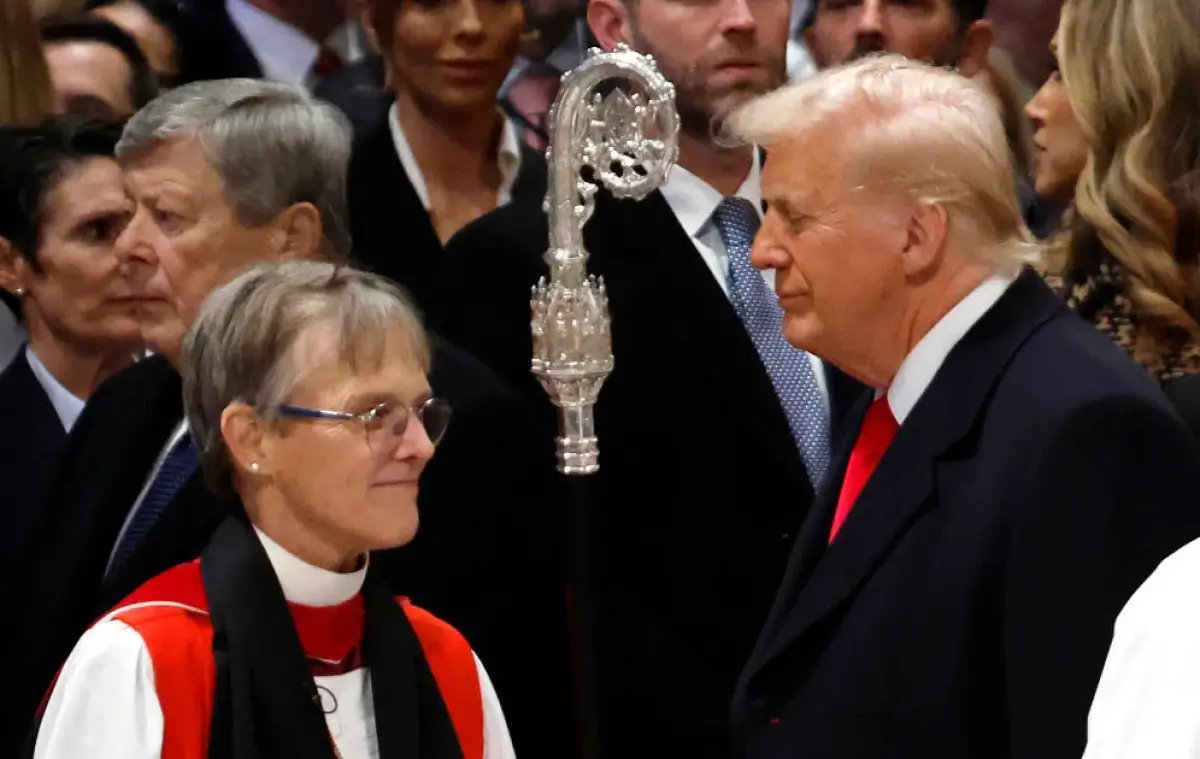During a prayer service held as part of President Donald Trump’s inauguration, the Episcopal bishop of Washington, the Right Rev. Mariann Budde, delivered remarks that ignited a wave of criticism. Instead of focusing solely on spiritual unity, Budde’s sermon took on a partisan tone, addressing topics like LGBTQ+ rights, immigration, and other hot-button political issues. The incident highlights ongoing tensions between faith leaders and political figures in the polarized landscape of American politics.
Budde’s Controversial Sermon
Bishop Budde began her address with calls for unity, stating that the congregation was gathered to “pray for unity as a people and a nation — not for agreement, political or otherwise — but for the kind of unity that fosters community across diversity and division.” However, her subsequent remarks shifted to a more pointed message aimed directly at President Trump, urging him to show compassion for undocumented immigrants and LGBTQ+ individuals.
“You have felt the providential hand of a loving God. In the name of our God, I ask you to have mercy upon the people in our country who are scared now,” Budde declared.
She emphasized the struggles faced by undocumented immigrants, many of whom work in essential industries like agriculture, healthcare, and food service. “They may not be citizens or have the proper documentation, but the vast majority of immigrants are not criminals. They pay taxes and are good neighbors,” she asserted.
Budde also addressed concerns about the treatment of LGBTQ+ individuals, highlighting their fears and calling on Trump to ensure their safety.
Trump’s Response
President Trump did not hold back in his criticism of the sermon. After returning to the White House, he expressed disappointment, describing the service as “boring and uninspiring.” On his social media platform, Trump referred to Budde as a “Radical Left hard line Trump hater” and accused her of using the pulpit to advance a political agenda.
“She brought her church into the world of politics in a very ungracious way. She was nasty in tone and not compelling or smart,” Trump remarked. He went on to suggest that Budde and her church owed the public an apology for what he saw as inappropriate behavior during a sacred event.
Trump also used the opportunity to reiterate his stance on immigration, pointing out instances where individuals who entered the country illegally had committed crimes.
Broader Criticism
Trump was not alone in his objections. Representative Josh Brecheen (R-OK) left the service early in protest, later explaining his decision in a post on social media.
“I purposely left the prayer service early after realizing how the pulpit was being used for liberal means and not for true worship unto God and to seek His will and wisdom,” Brecheen stated. “What accosted you today was political, not Biblical.”
The controversy surrounding Budde’s remarks is not the first instance of tension between her and Trump. In 2020, Budde condemned Trump for staging a photo op in front of St. John’s Episcopal Church, where he held up a Bible after the area had been cleared of protesters. At the time, she described his actions as “outrageous” and criticized what she called his “racialized rhetoric.”
The Role of Faith Leaders in Politics
The incident raises broader questions about the role of faith leaders in political discourse. While many religious leaders emphasize the importance of remaining nonpartisan, others believe it is their moral obligation to address societal issues and hold leaders accountable. Budde’s remarks reflect this tension, as she framed her plea as a call for compassion rooted in faith.
However, critics argue that her approach undermined the spirit of the occasion. Prayer services, particularly those held during significant national events, are traditionally viewed as opportunities to promote unity and reflection rather than political advocacy.
Implications for Future Relations
The fallout from Budde’s sermon highlights the challenges of navigating the intersection of faith and politics in a deeply divided country. For Trump and his supporters, the incident served as a reminder of the opposition he faces not only from political adversaries but also from some within the religious community.
On the other hand, Budde’s defenders argue that her remarks were a necessary expression of moral responsibility. They contend that issues like immigration and LGBTQ+ rights are not solely political but also deeply ethical concerns that demand attention.
Moving Forward
As the nation continues to grapple with these complex issues, the relationship between religious leaders and political figures is likely to remain a contentious topic. While some may see Budde’s sermon as a courageous act of speaking truth to power, others view it as an unwelcome intrusion of politics into a sacred space.
For President Trump, the incident is another chapter in his tumultuous relationship with faith leaders who have been critical of his policies and rhetoric. Meanwhile, the broader conversation about the role of religion in shaping public discourse is far from over.

